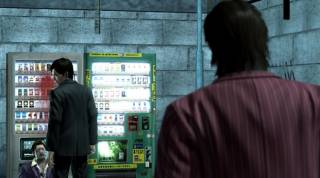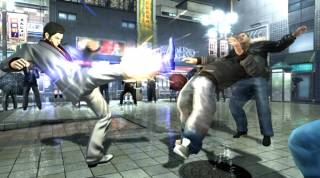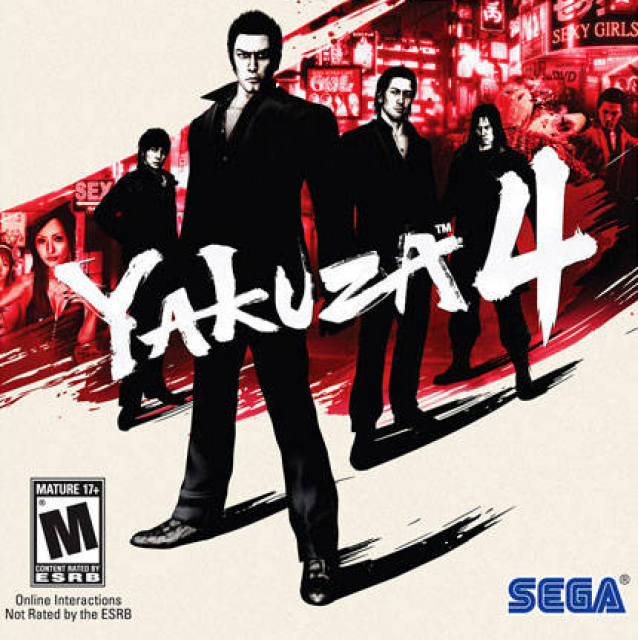Yakuza 4: Once More Down the Mirroring Rabbit Hole
When high profile Japanese games have been released overseas in recent years, they tend to garner a sort of critically analytical reception. Employing tropes and gameplay mechanics that are distinct and often operate differently than their western counterparts, Japanese games tend to, for better or for worse, attract the label of being “so Japanese” in terms of sensibilities and the sort of audience they attract. Although Yakuza 4 does exhibit some of these same apparent quirks, it's ultimately a Japanese game in a more abstract sense. Down to its very core, Yakuza 4 is a game whose themes, storylines, and commentaries are all tailored specifically for a native Japanese audience that is in tune with the trends and issues affecting Japan today. Because of that, there are likely a lot of little things that those who don't live there or at least study its language and culture will likely miss, but it's precisely that devotion to portraying a more skeptically realistic Japan that's also the greatest thing to be taken away from Yakuza 4 after playing it.

Contrary to previous entries in the series that centered around the same protagonist, Kiryu Kazuma, Yakuza 4 has you experiencing the daily lives of three other playable characters in addition to him. As you might suspect, all four of them have ties that eventually force their initially separate lives to converge together for a common cause, brought about political strife within the Tojo Clan, the main yakuza entity that encompasses a variety of smaller member families. What starts out as just a minor fight between two members of lower tier families quickly turns into a murder that is tied into a larger conspiracy that affects the prospects of many more people. While this sort of setup is one that certainly isn't unfamiliar to those who like mafia-related fiction or have even played previous Yakuza installments, it remains engaging because of strong and surprisingly relatable characterizations that compliments what is by and large a plausible, down to earth plot, even if it's sometimes easy to get lost in the numerous nuances that are obsessed over in the game.
Naturally, the main focus of both the game's story and its actual gameplay is on the four playable characters that you'll play as over the course of the game. Despite the fact that they all by and large conduct their lives and work in the same fictional district of Kamurocho, they're all up to pretty different antics, which makes each of their segments feel distinct, even if they tend to operate pretty similarly on a mechanical level. At the start of the game, for example, you take on the role of Shun Akiyama, a kind, generous moneylender who only loans money to people that can pass tests that he specifically tailors towards them. He also happens to run a hostess club on the side when he isn't competing with more ferociously conventional loan sharks. Contrast all of that that with Masayoshi Tanimura, a low-ranking detective whose main driver in his life and work is figuring out what got his father killed while he was solving a mystery decades ago. When he's not directly focused on that, though, he's also known to provide assistance of all sorts to Kamurocho's immigrant population, illegal or otherwise, disgusted at the exploitation and oppression that often takes place at their expense. Each of the characters has these sorts of differences amongst themselves that ensures that playing through their respective storylines and sidequests doesn't feel like deja vu. Even when everyone does start to cross paths, it's done in a matter that respects their individuality. They have their own mentalities and ways of doing things and the situation won't change that.

There are also a number of universal sidequests and other nonessential activities in which all of the characters can engage, though. Kamurocho is designed to be the sort of place where you have something to do in nearly every nook and cranny, even if you're on the rooftops or underground. Whether you're up for gambling via pachinko, mahjong, or cards, want to play some arcade games at the local Club Sega, dine out at the local restaurants, or even take out a hostess for a date, you can conceivably and easily do so. The sheer diversity of activities means that you'll probably have some that you love and some that you don't really care for, but at the very least, you get the impression that you can do pretty much anything you'd actually want to do in a Japanese city and the game's sense of immersion benefits greatly from that. You also get rewarded in a variety of ways for going out of your way to try all of the different activities, so it isn't as though they're just there for the sake of being there. If you want to get everything out of the game and make your characters the best that they can be, it will be in your best interest to go out on the town quite frequently.
Of course, being a Yakuza game, there's also a lot of three-dimensional brawler combat through which to wade. This aspect of the game also exhibits a sense of shared similarities in the fundamentals that are accented with clear differences in execution between all four playable characters. Everyone shares the same basic means to rack up combo hits and execute special attacks, but their overall personalities and fighting styles also means that every character isn't a complete facsimile of the others. You can be successful at employing the same basic tactics across the board, but mastery comes in understanding their actual style and how to perform their circumstantially unique special attacks. Akiyama is a speedy man who focuses on kicks and improvises more with his surrounding environment than the other characters, whereas Tanimura is heavy on the counters and utilizing his opponents' own momentum and movements to deal damage. Longtime notorious yakuza Taiga Saejima, meanwhile, prefers to utilize brute force and charge attacks, while series mainstay Kiryu Kazuma prefers to be mobile and reactionary, able to remain powerful while still easily turning and changing directions mid-attack. These sorts of differences become more vivid the longer you play each one, as the game employs an experience point system that you'll use to unlock their trademark moves and abilities. Furthermore, doing certain types of sidequests will also provide you with more unique options to utilize with each character, sometimes even outright changing how you approach certain situations once a character has a specific move for dealing with them.

The actual combat itself in Yakuza 4 continues to be enjoyably violent and oftentimes brutal. Although a lot of the fighting with regular enemies can boil down into just using the same reliable combos and strategies, the special moves and environmental attacks that you can perform are what keep your attention. Both of these result in short cutscenes that are often interspersed with short, but easy to perform quick time events that are fun to watch just by virtue of how much damage the enemy is visibly receiving. You know an enemy is really going to hurt if a baseball bat knocks their legs out from under them and then sets up a home run on their head, for instance. The moves themselves are simple, but since the game doesn't flinch or cut away from the action as its happening, you're allowed to bask in every bit of pain you bring down upon the opposition. Plus, the fighting arenas are typically just spontaneously created as you walk around town and aren't confined to specific layouts, instilling a dynamic sense that a brawl can break out anywhere and at any time, which is often the case. Towards the end of the game, things can become stale if you partake in a lot of the random encounters with street punks and yakuza, but thankfully they can be avoided if you really just care about getting other business done.
On the technical side of things, Yakuza 4 is a game that's impressive in some places and merely adequate in others. Its greatest accomplishments in that regard are probably related to its data streaming and its visuals. While the game does have a forced install that still comes with some load times between cutscenes and certain activities, when you're just out and about roaming Kamurocho, there's no loading times whatsoever. You can walk from one end to the other without ever seeing the game stutter as it figures out what to bring up next, something which helps make the area feel like one cohesive place. Likewise, the graphics do a great job in the right places. While the models of non-player characters outside of the cutscenes can sometimes look a little low-end and even garish, the sheer attention to detail in the modeling and texturing of the surrounding scenery is something that's to be commended. Sega set out to create as realistic of a recreation of Tokyo's Kabukicho district as it conceivably could and it completely delivers on that front. Advertisements use real Japanese brand names and are laid out realistically. Convenience stores neatly stack their magazines right by the front windows, while bars are claustrophobically compact, barely able to fit more than the bartender and a few patrons at any time. Those who have lived in or at least visited Tokyo will probably be struck at just how true to the real thing Kamurocho is, while those who have only dreamt of going to Japan will get a good aesthetic primer on what the game looks like. Much like what you can actually go out and do in the game, what you can see and touch lends Yakuza 4 its own sense of realism that you can believe. In addition to issues with some character models, the game does have pop-in for the pedestrians and objects that inhabit the game as you run around in it, but usually it's so quickly resolved that they don't detract that much from how realistic Kamurocho otherwise typically appears.

The sound design, music, and voice acting that Yakuza 4 is also really good. The sounds of punches, kicks, thumps, and what have you all sound appropriately rough and have a good amount of impact during the fights. Ambient sounds that you also hear while walking around town also, like the visuals, remain consistent with what you would actually encounter in real life. Music in the game is also composed well, primarily employed to get you jazzed for some energetic fighting, but it is also used to good effect to elicit other sentiments during cutscenes and optional activities. Voice acting in Yakuza 4 is probably the game's strongest suit, still utilizing the original edition's Japanese. Although it doesn't appear often enough outside of major cutscenes, what is there is great, full of inflections and nuances that help each character stand out even further than they already do. Those who speak Japanese will notice just how differently each person will talk as a reflection of their background, mannerisms, and even their birthplace, although those who don't know Japanese will still at least notice the emotionally convincing aspects of the performances.
A special note should also be made for the game's text localization. Games like Yakuza 4 often have unique translation issues related to the differences in English and Japanese that can make it difficult to have non-native versions remain reasonably true to the source material. Organizations like the yakuza make use of unique speech patterns and vocabulary words in Japanese that don't really have clear-cut counterparts in other languages. In Yakuza 4's case, certain liberties have indeed been taken to make the game feel more naturally worded in English, but usually they're intelligently done. The game's lines aren't straightforward textbook translations of the original Japanese, but that's also to its advantage. People are still written to be like the gangsters, policemen, and civilians that they really are and that's what ultimately makes a game that's so thoroughly set in Japan approachable to foreign audiences. They still might not completely understand everything that's going on without spending some time over in Japan themselves, but what's there is done in terms that they can relate to in their own language and that's what's important. There are a few very minor proofreading issues that can be spotted, but they're so sporadic that they're forgettable if you're not a writer yourself.

Not unlike other entries in the Yakuza franchise, Yakuza 4 is best enjoyed if you have a personal interest and understanding of Japanese life and culture. This is a game that, unlike so much of today's pop culture exports from there, is concerned about portraying Japan at both its best and worst. It's not afraid to show off some cultural and political warts in telling its story and comprehending those aspects can be hard without some previous experience with them. There are also issues with parts of the gameplay and graphics that show that the development team was definitely stretched out thinly in places when trying to bring its Tokyo look-alike to life. Having said Yakuza 4's mission is a mostly successful one and there's no better place to start in searching for a more realistic portrayal of Japan in one of its own video games. It wasn't designed with Western tastes or sensibilities in mind, but that's also the selling point of the entire series.
